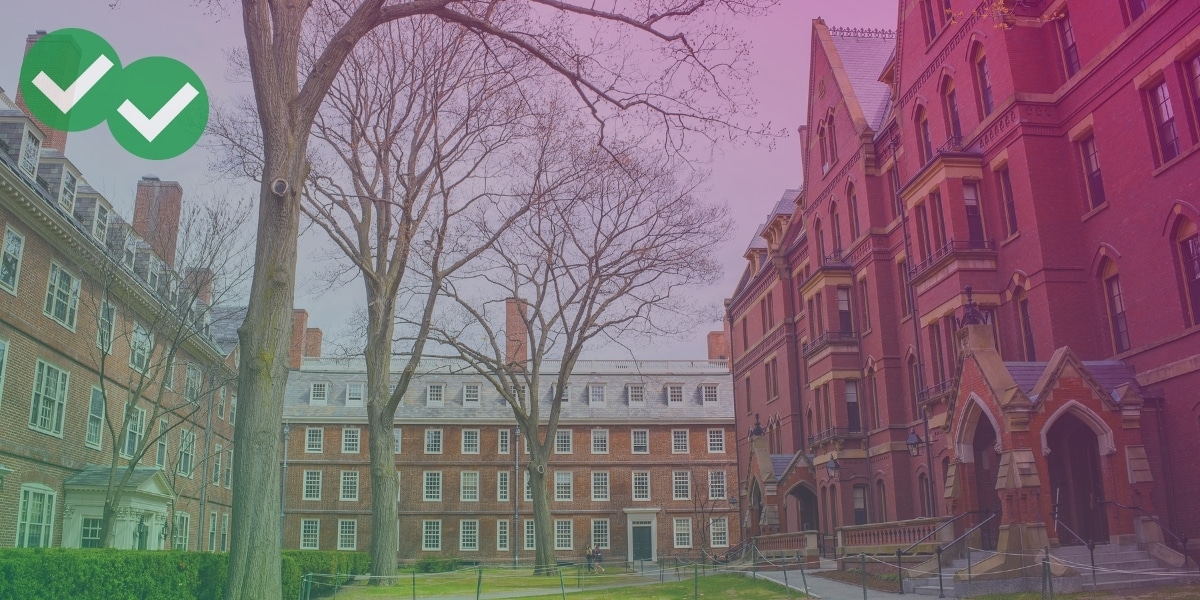One of the top law schools, the creme de la creme: Harvard Law School’s reputation definitely preceded it even before Legally Blonde. So if you’ve got Harvard on your mind, what should you be doing? You’re in the right place! Here, we’ll talk about everything from the Harvard Law School acceptance rate to its programs and curriculum. Take a look!

Harvard Law School: Acceptance Rate, GPA, and Scores
If you’re aiming for Harvard, no doubt about it—you’ll need top grades, test scores, and a highly polished application (it’s ranked #3 in the country by US News & World Report, after all!). Here’s what you need to know about how to get into Harvard Law in brief:
| Category | Admission Statistic |
|---|---|
| Acceptance Rate | 13% |
| LSAT Score (Median) | 174 |
| LSAT Score (25th-75th percentile) | 170-176 |
| GPA (Median) | 3.92 |
| Class Size | 560 |
| Student/Faculty Ratio | 7.1:1 |
(Sources: US News & World Report, Harvard Law Admissions Class Profile)
One thing you’ve probably noticed from the above table? Harvard LSAT scores are astronomical! Luckily, that’s one part of your application you can control.
How else can you ensure that next year’s Harvard Law School acceptance rate includes you? First, make sure you understand the programs and curriculum they offer. Then, take a look at what you need for your Harvard Law School application.
Programs and Curriculum
Harvard Law School has three primary programs: the J.D, the L.L.M, and the S.J.D. (a doctoral program in law). In addition, they also have joint degree programs in: law and business; law and government; law and public health; and law and urban planning. As if that weren’t enough, there’s also a joint degree J.D./L.L.M. program between Harvard and the University of Cambridge! (Source: Harvard Law School)
For those pursuing the J.D. track, they can expect a rigorous, top-notch legal education. In 1L, students take foundational courses in everything from constitutional law to torts. They also take part in a January Experimental Term, building skills to serve them in the real world. In addition, they’ll work on their research and writing skills with a specialized course. However, there is still room for them to take an elective course in the spring.
After the first year, students can choose an optional program of study from among the following:
- Law and Government
- Law and Social Change
- Law and Business
- Law and History
- Criminal Justice
- International and Comparative Law
- Law, Science and Technology
In their final year, students also have the option to choose a capstone project to apply the knowledge they’ve gained to contemporary legal issues.
If this sounds tempting to you, read on for the Harvard Law School requirements!
How to Apply
In many ways, Harvard asks for the same law school requirements as other law schools. These include:
- The LSAC application, including CAS report
- A resume
- A personal statement (correctly formatted!)
- Either LSAT or GRE scores
- Official transcripts for all graduate and undergraduate work
- Two letters of recommendation (three will be accepted)
- An optional statement about your contributions to the law school community
- Character and Fitness questions
Some students may be invited to interview via Zoom after submitting their applications.
(Source: Harvard Law School Admissions website)
Why is Harvard Law School hard to get into?
With Harvard Law School tuition creeping upwards towards $70,000 a year (Source: Harvard Law Financial Aid page), it’s definitely not the price of the school that makes it so competitive! (Though there are strong financial aid options available!) So just what makes that Harvard Law School acceptance rate so low?
First of all, the prestige. Harvard’s rankings reflect this: not only is it currently ranked third in the country, but it takes the top spots in Business/Corporate Law, Constitutional Law, and Dispute Resolution, while ranking very high in numerous other areas. This isn’t just about applicants’ desire to get that Harvard line on their resumes—it’s also about the opportunities that Harvard Law opens up to students after graduation, not least through the extensive alumni network.
This is reflected in the career statistics of graduates. 91.3% are employed at graduation. And they’re well prepared for those jobs, too—98.9% of Harvard Law School students pass the bar on their first try, an astronomical rate.
Beyond that, Harvard has incredible resources. It’s the oldest (continuously operating) law school in the U.S., and has the biggest law library anywhere. In addition, it has 100+ full-time professors and 150+ visiting professors, teaching 260+ courses overall. No matter what aspects of law interest you, Harvard’s likely to have top faculty members teaching it.
With all of that in mind, Harvard Law probably sounds pretty appealing right now! So what are you waiting for? It’s time to start gathering those application materials and showing the admissions committee just why you deserve to be part of next year’s entering class!






